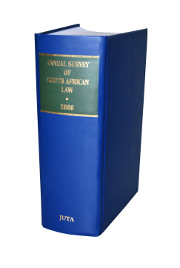Constitutional Property Law

Constitutional Property Law
Authors AJ van der Walt
ISBN: 978 1 48513 300 1
Affiliations: Professor, Faculty of Law, Stellenbosch University and South African Research Chair in Property Law, hosted by Stellenbosch University, funded by the Department of Science & Technology, administered by the National Research Foundation
Source: Annual Survey of South African Law, 2012, p. 182 – 199
Abstract
None